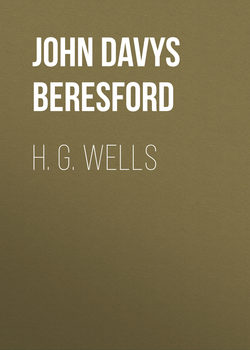H. G. Wells

Реклама. ООО «ЛитРес», ИНН: 7719571260.
Оглавление
John Davys Beresford. H. G. Wells
I. INTRODUCTION
II. THE ROMANCES
III. THE NOVELS
IV. SOCIOLOGY
A BIBLIOGRAPHY OF H.G. WELLS'
AMERICAN BIBLIOGRAPHY
Отрывок из книги
Mr Wells' romances have little or nothing in common with those of Jules Verne, not even that peculiar quality of romance which revels in the impossible. The heroes of Jules Verne were idealised creatures making use of some wonderful invention for their own purposes; and the future of mankind was of no account in the balance against the lust for adventure under new mechanical conditions. Also, Jules Verne's imagination was at the same time mathematical and Latin; and he was entirely uninfluenced by the writings of Comte.
Mr Wells' experiments with the relatively improbable have become increasingly involved with the social problem, and it would be possible to trace the growth of his opinions from this evidence alone, even if we had not the valuable commentary afforded by his novels and his essays in sociology. But his interest in the present and future welfare of man would not in the first place have prompted him to the writing of romance (unless it had been cast in the severely allegorical form of The Pilgrim's Progress), and if we are to account for that ebullition, we shall be driven—like Darwin with his confounding peacock—to take refuge in some theory of exuberance. The later works have been so defensive and, in one sense, didactic that one is apt to forget that many of the earlier books, and all the short stories, must have originated in the effervescence of creative imagination.
.....
In the seclusion of his island, and with the poor assistance of the outlawed medical student, Montgomery, Dr Moreau succeeded in producing some creditable parodies of humanity by his operations on pigs, bulls, dogs and other animals. These cut and remoulded creatures had something the appearance and intelligence of Homo Sapiens, and could be maintained at that level by the exercise of discipline and the constant recital of "the Law"; left to themselves they gradually reverted to the habits and manners of the individual beasts out of which they had been carved. We may infer that some subtle organic chemistry worked its determination upon their uncontrolled wills, but Mr Wells offers no explanation, psychic, chemical or biological, and I do not think that he intended any particular fable beyond the evident one that, physically, one species is as like to the next as makes no matter. What Moreau did well another man might have done better. It is a good story, and the adventures of the marooned Prendick, alone, are sufficient justification for the original conception. (I feel bound to note, however, the absurd comments of some early reviewers who seemed to imagine that the story was a defence of vivisection.)
The next romance (1897) seeks to answer the question: "What could a man do if he were invisible?" Various attempts to answer that question had been made by other writers, but none of them had come to it with Mr Wells' practical grasp of the real problem; the earlier romantics had not grappled with the necessity for clothes and the various ways in which a material man, however indistinguishable his body by our sense of sight, must leave traces of his passage. The study from beginning to end is finely realistic; and even the theory of the albino, Griffin, and in a lesser degree his method of winning the useless gift of invisibility, are convincing enough to make us wonder whether the thing is not scientifically possible. As a pure romance set in perfectly natural surroundings, The Invisible Man is possibly the high-water mark of Mr Wells' achievement in this kind. He has perfected his technique, and the interest in the development of the story works up steadily to the splendid climax, when the form of the berserker Griffin returns to visibility, his hands clenched, his eyes wide open, and on his face an expression of "anger and dismay," the elements—as I choose to think—of man's revolt against imprisonment in the flesh. It is worth while to note that by another statement, the same problem is posed and solved in the short story called The Country of the Blind.
.....